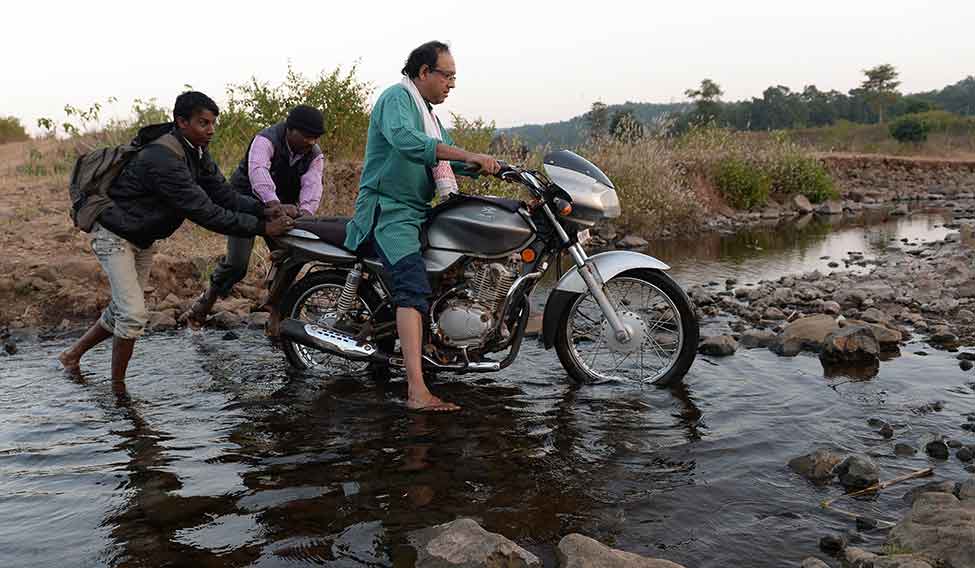Do you have any role models? What prompted you to become an activist?
No, I don’t have any role models. I was 21 and jobless when I took up my first job with an NGO. They wanted volunteers for Betul [a district in Madhya Pradesh] and so I joined. When I came to Mandla-Dindori [as an NGO coordinator], I realised that I had something in common with the Baiga community there—a sense of loss of identity. Born into a Bangladeshi family displaced by the communal riots, I had lost my identity, language, culture and ethos over the years living as a 'refugee' in Chhattisgarh. The Baigas, I realised, were going to meet a similar fate. The way they were being thrown out of the jungles and being forced to adopt modern agriculture practices, the day would not have been far when they, too, would have lost touch with their language and culture. I didn't want the Baigas to lose their identity the way I had.
Why don't you take funds from government agencies?
I don't have any problem with the government as a funding agency. After all, what the government has is public money. However, the funds are managed by officials and that is the problem. If a good officer is there at the helm, things work smoothly, but problems arise when a corrupt one takes over. I end up wasting my energy in ‘managing’ such officers. I don’t want to waste my limited time and resources in ‘managing’ a corrupt system. There are certain types of NGOs that are happy to work with the system like the way contractors do, but I do not want to become one among them. Now that we have a very good collector in Dindori [Chhavi Bhardwaj], we are thinking of taking government funds.
Bewar or slash-and-burn cultivation is not a high-yielding crop pattern. What solution do you have for the growing food demand?
It is wrong to say that bewar is not high yielding. It is a combination of high-yielding millets and protein-rich cereals and pulses. There are certain types of pulses that help in meeting the nutritional—protein and vitamins—needs of the Baigas. Bewar ensures domestic food security and it also generates revenue. There are Baiga families that have sold arhar dal worth $40,000 from their fields.
Why don’t you involve the educated, urban youth in your work?
The educated boys treat this work as an eight-to-five job. They would prefer to live in a village with roads. The native, less educated boys, on the other hand, don't have any hesitations. They live the same life as the Baigas do. The boys educated outside have different aspirations. Initially, I had boys with formal education—who had an MSW [master's in social work]—but they were interested in making easy money. The Baigas grow ganja for self-consumption. But it is illegal for outsiders to grow it.
What challenges have you faced?
There was a time when the traders in the region created problems and worked against the weaving of cheap cloth for the Baigas. Initially, the police suspected me of being a Naxalite who was trying to create unrest among the Baigas, but later they realised that my intentions were good.
Did you ever have any run-ins with the law?
As a volunteer of Ekta Parishad, I used to write applications for poor adivasis who wanted to avail the benefits of government schemes. If there was any complaint against some erring forest official, I used to write it down and forward it to the collector. Once, a woman from Manikpur village complained about a forest guard, who forced her to eat her own excreta. The collector of Mandla, however, accused me of manufacturing the incident. He summoned me to his office and we had a heated argument. A false case was registered against me and 15 Baigas for felling 400 trees and I was put behind the bars for 14 days. The case went on for 12 years and I was finally acquitted.
Despite a dozen schemes being implemented, why has life not improved for the Baigas?
Being a tribal region, it automatically gets huge funds. The funds are planned at the top level and spent as per a fixed target. Had the planning been done at the ground level, depending on the requirements of the Baigas, things would have been different. The schemes have a trickle-down effect, thereby not really benefiting the poor.
In the age of global warming, could bewar cultivation pose a threat?
No, the kind of bewar cultivation that I am propagating and the one that the Baigas currently practise could be the solution to global warming. Bewar does not involve the use of fertilisers, pesticides or modern implements. It is a traditional form of farming, which even the scientists are now promoting.
Education has not yet penetrated the Baiga region. What do you plan to do about it?
We have not done anything for education directly but, yes, indirectly we have created a mechanism to report to district headquarters when the teachers remain absent. Since we don’t have the resources, we focus on issue-based work. I want to create awareness among the Baigas. The rest should be taken care of by the departments created by the government for education and health.
What is the status of the other Bangladeshi refugees?
Almost all the families are in the mainstream. Many have got government jobs while some are engaged in agriculture. However, a major grudge is that we have lost our 'identity'. We are still known as refugees.
Which was the most satisfying moment in your life as an activist?
It was when the Dindori collector informed me that she was going to enforce “habitat rights” for the Baigas of seven villages in the region. It is a big achievement for a primitive tribe in India. The Baiga community will be the first in southeast Asia to have habitat rights.






